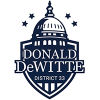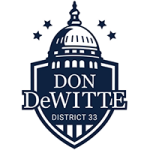Senator DeWitte Hosts Successful Cybersecurity Event
 In partnership with two experienced cybercrimes experts from the FBI, on Thursday I hosted an online session on how to remain safe on the Internet, and prevent online identity theft. The one-hour webinar also provided tips on keeping children safe from online predators, and information on how to report incidents of suspected cybercrime to the FBI Chicago office. We had over 120 RSVPs for this event, and unlike most virtual events where some participants leave the Zoom meeting before the end, not one participant exited the Zoom prior to the end of the session. It was an excellent presentation filled with useful information.
In partnership with two experienced cybercrimes experts from the FBI, on Thursday I hosted an online session on how to remain safe on the Internet, and prevent online identity theft. The one-hour webinar also provided tips on keeping children safe from online predators, and information on how to report incidents of suspected cybercrime to the FBI Chicago office. We had over 120 RSVPs for this event, and unlike most virtual events where some participants leave the Zoom meeting before the end, not one participant exited the Zoom prior to the end of the session. It was an excellent presentation filled with useful information.
My deepest thanks go out to our presenters, Supervisory Special Agents Jay Patel and Matt Osegard, who took high level information and explained it in a way that everyone could understand. Agents Patel and Osegard offered to provide a summary sheet of the presentation’s most important information, and when I receive it, I will share it with participants and post it to my website.
Looking ahead, next week my office will be holding traveling office hours on Monday, October 18 from 9:30-11:30 a.m. at the St. Charles Public Library, 1 South 6th Avenue in St. Charles. While I attend these traveling office hours as my schedule permits, a member of my highly-trained staff will be on hand to help constituents navigate state agencies and find solutions to a variety of issues. Whether it is FOID or CCL delays, unemployment problems, certification issues, or other state-related problems, my staff is available to help. Please stop by if my office may be of assistance.
Then on Monday, November 1, I am partnering with the Illinois Student Assistance Commission (ILAC) for a free online seminar on applying for federal and state student financial aid and options for repaying student loans. The one-hour webinar starts at 6:00 PM.
Specifically, this webinar outlines the financial aid process and provides insight on how financial aid works, how to apply for it, student eligibility, and how it can be used to help pay for college. It introduces the Free Application for Federal Student Aid (FAFSA) and the Alternative Application for Illinois Financial Aid, along with summarizing state and federal aid programs for undergraduate and graduate-level students. Because this is an online event, registration is required. Information on how to join the webinar will be sent to registrants prior to the November 1 event. To register, please visit: https://www.ilsenategop.org/sen_dewitte_virtual_fafsa_student_loan_seminar.
For additional information about these or other events, please contact my office at (847) 214-8245, or contact Paige at PBuente@sgop.ilga.gov.
Veto Session Begins Next Week; Congressional Maps Released
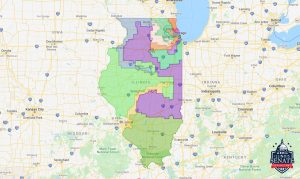 Lawmakers return to the Capitol next week on October 19 to begin the annual fall veto session. The two-week session is designed to allow the General Assembly to take action on legislation vetoed by the Governor. Because Gov. Pritzker has vetoed very few bills, majority party leaders may decide to take up any number of other issues instead. I’m hearing the majority party has a few controversial items they may bring forward for votes, so stay tuned.
Lawmakers return to the Capitol next week on October 19 to begin the annual fall veto session. The two-week session is designed to allow the General Assembly to take action on legislation vetoed by the Governor. Because Gov. Pritzker has vetoed very few bills, majority party leaders may decide to take up any number of other issues instead. I’m hearing the majority party has a few controversial items they may bring forward for votes, so stay tuned.
Senate Republicans have continued to push for the legislature to use the annual fall veto session as a time to hold hearings to discuss the ongoing spike in violent crime across the state, and to take action on legislation to help empower the criminal justice system to get violent criminals off of the streets, get illegal guns out of communities, and shore up mental health services.
Late this morning (Oct. 15), the majority party released the proposed Congressional Map that legislators will consider during veto session. It is not unusual for the map that ultimately is brought forward for a vote to be different than the map that is originally released to the public. Because they released the map before hearings across the state were finished, Democrats canceled two additional map hearings scheduled for this week.
Regional Listening Tour Continues
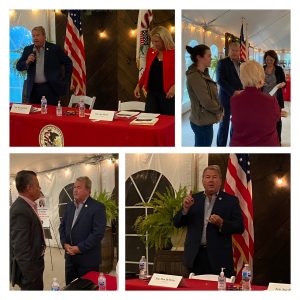 On Tuesday, I had an opportunity to Join Deputy Minority Leader Sue Rezin at a listening tour town hall she hosted in Oswego. Together, we spoke to a crowd of about 100 about important issues affecting our state. The evening included a short PowerPoint presentation and plenty of time for Q and A.
On Tuesday, I had an opportunity to Join Deputy Minority Leader Sue Rezin at a listening tour town hall she hosted in Oswego. Together, we spoke to a crowd of about 100 about important issues affecting our state. The evening included a short PowerPoint presentation and plenty of time for Q and A.
As part of our caucus-wide listening tour, I will be hosting a town hall meeting on Wednesday, November 17 at 6:00 p.m. at Elgin Community College. Senate Minority Leader Dan McConchie and Deputy Leader Rezin will be joining me at this event. In addition to the town hall meeting, we will co-host a teleforum on Tuesday, November 30 at 7:00. RSVPs for these events are appreciated. To reserve a spot at the town hall meeting click here, and to RSVP for the teleforum, click here.
New FBI Data Highlights State’s Issues with Violent Crime
The Federal Bureau of Investigation (FBI) recently released new data on crime across the nation. According to the report, Illinois’ 2020 rate of violent crime per 100,000 people was 425.9, an increase from the 2019 rate of 415, and notably higher than the national average of 398.
In 2020, Illinois experienced 9.1 murders per 100,000 people, also significantly above the national average of 6.5. While the homicide rate is increasing nationally, at a rate of approximately 27 percent from 2019 to 2020, the homicide rate in Illinois has increased 36 percent over the same timeframe.
Members of the Senate Republican Caucus recently introduced more than a dozen bills specifically designed to help alleviate the surge in violence across the state. I believe that it is urgent that the General Assembly take up the package of public safety measures during the upcoming fall veto session.
JCAR Set to Meet Oct. 19
On the first day of our fall veto session (Oct. 19) next week, the Joint Committee on Administrative Rules (JCAR) is scheduled for its monthly meeting at 10:30 a.m. You may recall, at our September meeting the Republicans and Democrats on JCAR handed down this unanimous recommendation to the Illinois State Board of Education (ISBE) regarding its enforcement of Governor Pritzker’s mask mandate for schools:
“There is a concern that policy outside of rule may exist and JCAR encourages ISBE to place all policy and guidance in administrative rule. JCAR recommends ISBE provide an update to the committee on this point within 30 days. Additionally, JCAR recommends that ISBE propose additional amendments to 23 Ill. Adm. Code 425 expanding and clarifying the school recognition process to include a better-defined process prior to revoking a school’s recognition.”
As of this writing, ISBE has not responded to the Committee’s September recommendation and requests related to the use of policy outside of rule and the recognition process for non-public schools.
Please keep in mind that JCAR is not a policy-making panel. We are charged with overseeing the rule-making process to ensure that laws, or in this case executive orders, are carried out within the confines of existing law.
Keep an Eye Out for Farm Equipment
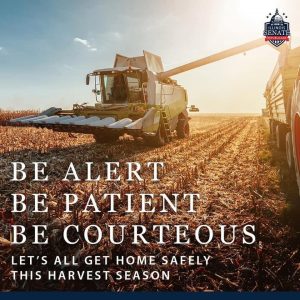 Its harvest time, so please be careful on rural roads. Modern farm equipment is typically large, often wider than traffic lanes, and difficult to see around, while traveling at very slow speeds on the roadway. According to the University of Illinois Extension Service, a car going 55 mph only has five seconds to brake 300 feet, the length of a football field, to avoid rear-ending farm equipment moving at 15 mph.
Its harvest time, so please be careful on rural roads. Modern farm equipment is typically large, often wider than traffic lanes, and difficult to see around, while traveling at very slow speeds on the roadway. According to the University of Illinois Extension Service, a car going 55 mph only has five seconds to brake 300 feet, the length of a football field, to avoid rear-ending farm equipment moving at 15 mph.
The Extension Service also notes that the operator of the farm equipment may not know that a vehicle is nearby, particularly if the vehicle is very close behind or alongside the implement. They recommend that drivers be vigilant and watchful for equipment, slow down when passing or near farm implements, and allow a wide berth for the equipment to pass.
Harvest season may continue for a while yet. According to the United States Department of Agriculture’s National Agricultural Statistics Service, the Illinois corn harvest is currently about halfway finished at 55 percent, with about 43 percent of soybeans harvested.
